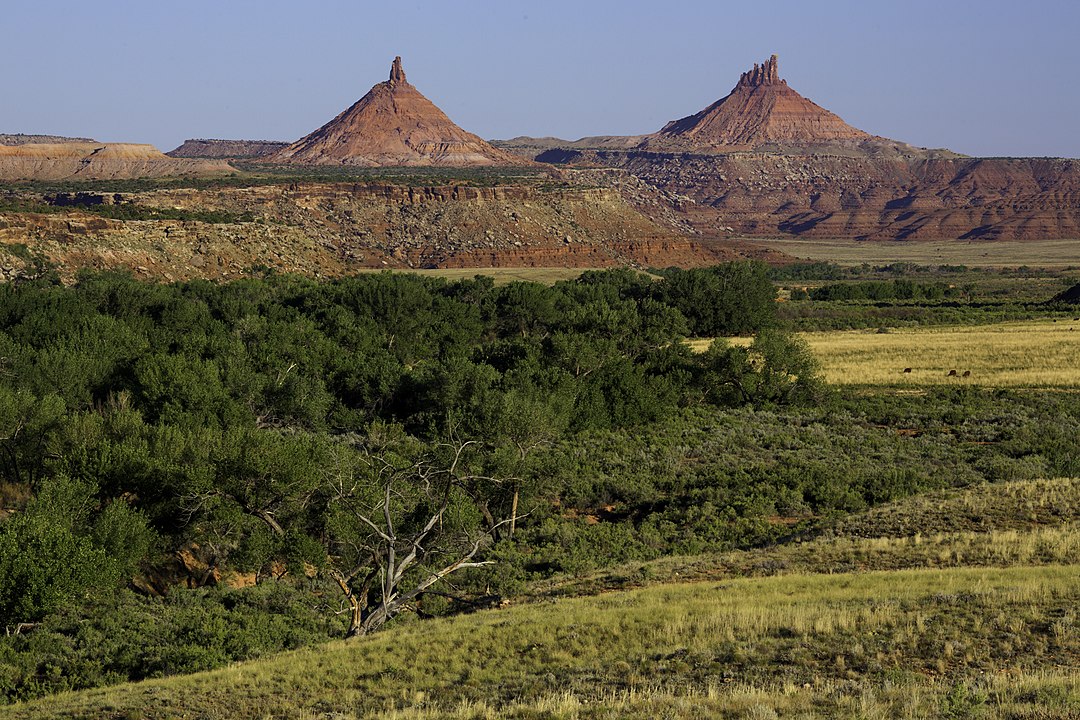
- Details
- By Levi Rickert
Opinion. This Sunday. June 8, 2025, marks the 119th anniversary of the Antiquities Act of 1906, a landmark conservation law that gives U.S. presidents power to protect public lands of historic, cultural, or scientific significance.
President Theodore Roosevelt signed the Act into law, and it has preserved some of our nation’s most cherished landscapes, including national monuments that hold deep cultural and spiritual significance for tribal nations.
But national monuments face immediate danger under the Trump administration’s assault on public lands. The administration has launched a concerted effort to undermine the Antiquities Act and strip protections from national monuments, targeting many with strong Indigenous ties. This threatens both the environment and tribal sovereignty.
From slashing budgets and firing thousands of park rangers to reducing protections that pave the way for privatization, the intent is clear: to open these lands to exploitation by mining, drilling and timber corporations.
The Antiquities Act was originally enacted to protect archaeological sites from looting and destruction. However, its application has evolved to include the protection of landscapes that are integral to the cultural and spiritual practices of Indigenous peoples. National monuments such as Bears Ears and Grand Staircase-Escalante in Utah, and Baaj Nwaavjo I’tah Kukveni—Ancestral Footprints of the Grand Canyon in Arizona, were designated with the input and support of tribal nations. These designations recognize the deep connection between Indigenous communities and these lands, acknowledging their role as stewards and caretakers.
In May 2025, Navajo Nation President Buu Nygren reaffirmed his administration’s commitment to the protection of Bears Ears and Grand Staircase-Escalante in a letter to Interior Secretary Doug Burgum. Nygren emphasized the need for full and meaningful tribal consultation before any changes are made to monument boundaries.
The Navajo Nation’s stance underscores the importance of respecting tribal sovereignty and the right of Indigenous peoples to have a say in the management of their ancestral lands.
Despite the strong support for these monuments, the Trump administration has initiated a series of actions aimed at dismantling protections for public lands. In February 2025, Interior Secretary Doug Burgum issued Secretarial Orders directing the review and potential revision of national monuments and other public lands previously withdrawn from extractive use. This review includes 13.5 million acres of land-based national monuments, encompassing critical wildlife habitats and watersheds that supply drinking water to millions of people.
In March 2025, the administration published a fact sheet proposing the revocation of national monument proclamations protecting nearly one million acres of land. Although this fact sheet was later removed, it signaled a clear intent to open these lands to mining, drilling, and other forms of industrial development. Such actions would not only degrade the environment but also infringe upon the rights of tribal nations whose ancestral lands are at risk.
In May 2025, the Department of the Interior approved the Velvet-Wood uranium mine, which threatens to transport ore through Bears Ears National Monument and Natural Bridges National Monument in Utah. This decision, made after an expedited 11-day review, disregards the ecological and cultural significance of these areas.
Furthermore, Burgum's Secretarial Order 3431, titled "Restoring Truth and Sanity to American History," seeks to erase Indigenous narratives from national monuments. This order undermines the very essence of these protected areas, which are meant to honor and preserve the diverse histories of our nation.
The 119th anniversary of the Antiquities Act serves as a reminder of the enduring value of preserving our nation’s cultural and natural heritage. It is a call to honor the commitments made to tribal nations and to uphold the principles of conservation and environmental justice. As communities across the country continue to advocate for the protection of national monuments, it is imperative that we stand in solidarity with Indigenous peoples and support efforts to safeguard these sacred lands.
On this anniversary of the Antiquities Act, let us remember its purpose: to protect the irreplaceable and ensure that future generations can experience the beauty and significance of our nation's most treasured places.
Now is the time to act—to resist the dismantling of protections and to reaffirm our commitment to safeguarding these lands for all.
The fight to protect our national monuments is a fight for justice, equity, and the future of our planet. Let us rise to the challenge and ensure that these sacred spaces remain protected, honoring the legacy of those who have fought to preserve them and the next seven generations yet to come.
Thayék gde nwéndëmen - We are all related.
More Stories Like This
When Journalism Is Treated as a Crime, Democracy Is in DangerDisrupting Poverty Through Opportunity
Marmot Day (Ground Hog Day) and the (Lack of) Law
Sanctuary Cities Under Siege: When Federal Power Becomes a Weapon Against the People
Denmark's Genocidal Practices in Greenland
Help us defend tribal sovereignty.
At Native News Online, our mission is rooted in telling the stories that strengthen sovereignty and uplift Indigenous voices — not just at year’s end, but every single day.
Because of your generosity last year, we were able to keep our reporters on the ground in tribal communities, at national gatherings and in the halls of Congress — covering the issues that matter most to Indian Country: sovereignty, culture, education, health and economic opportunity.
That support sustained us through a tough year in 2025. Now, as we look to the year ahead, we need your help right now to ensure warrior journalism remains strong — reporting that defends tribal sovereignty, amplifies Native truth, and holds power accountable.
 The stakes couldn't be higher. Your support keeps Native voices heard, Native stories told and Native sovereignty defended.
The stakes couldn't be higher. Your support keeps Native voices heard, Native stories told and Native sovereignty defended.
Stand with Warrior Journalism today.
Levi Rickert (Potawatomi), Editor & Publisher


